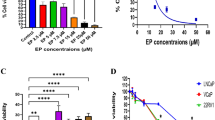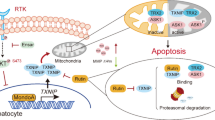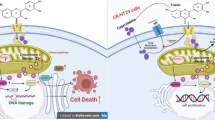Abstract
Objective
To explore the mechanisms underlying the proliferative inhibition of Chinese herbal medicine Kang-Ai injection (KAI) in gastric cancer cells.
Methods
Gastric cancer cell lines MGC803 and BGC823 were treated by 0, 0.3%, 1%, 3% and 10% KAI for 24, 48 and 72 h, respectively. The cell proliferation was evaluated by 3-(4,5-dimethyl-2-thiazolyl)-2,5-diphenyl-2-H-tetrazolium bromide (MTT) assay. The apoptosis and cell cycle were evaluated by flow cytometry. Interleukin (IL)-6 mRNA and protein expression levels were detected by quantitative real-time polymerase chain reaction (qRT-PCR) and enzyme-linked immune sorbent assay (ELISA), respectively. The protein expression levels of cyclin A, cyclin E, cyclin B1, cyclin D1, p21, retinoblastoma (RB), protein kinase B (AKT), extracellular regulated protein kinases (ERK), signal transducer and activator of transcription (STAT) 1 and STAT3 were detected by Western blot.
Results
KAI inhibited the proliferation of MGC803 and BGC823 gastric cancer cells in dose- and time-dependent manner. After treated with KAI for 48 h, the proportion of G1 phase was increased, expression level of cyclin D1 and phosphorylation-RB were down-regulated, whereas the expression of p21 was up-regulated (all P<0.01). Furthermore, 48-h treatment with KAI decreased the phosphorylation level of STAT3, inhibited the mRNA and protein expressions of IL-6 (all P<0.01). IL-6 at dose of 10 ng/mL significantly attenuated the proliferative effect of both 3% and 10% KAI, and recovered KAI-inhibited STAT3 phosphorylation and cyclin D1 expression level (all P<0.01).
Conclusion
KAI exerted an anti-proliferative function by inhibiting IL-6/STAT3 signaling pathway followed by the induction of G1 phase arrest in gastric cancer cells.
Similar content being viewed by others
References
Bray F, Ferlay J, Soerjomataram I, Siegel RL, Torre LA, Jemal A. Global cancer statistics 2018: GLOBOCAN estimates of incidence and mortality worldwide for 36 cancers in 185 countries. CA: Cancer J Clin 2018;68:394–424.
Cervantes A, Roda D, Tarazona N, Roselló S, Pérez-Fidalgo JA. Current questions for the treatment of advanced gastric cancer. Cancer Treat Rev 2013;39:60–67.
He YH, Duan SM. Progress in using combination of Chinese drug with chemotherapy to treat cancer. J Tradit Chin Med (Chin) 2004;24:153–157.
Zhang JL. Clinical observation of combined Kangai Injection with TP in the treatment of advanced non-small cell lung cancer. J Modern Oncol (Chin) 2010;18:1132–1134.
Zheng F, Zhao Y, Li X, Tang Q, Wu J, Wu W, et al. The repression and reciprocal interaction of DNA methyltransferase 1 and specificity protein 1 contributes to the inhibition of MET expression by the combination of Chinese herbal medicine FZKA Decoction and erlotinib. J Ethnopharm 2019;239:111928.
Zhang L, Xiong JP. Kangai Injection combined with chemotherapy in advanced gastric cancer. Cancer Res Prev Treat (Chin) 2009;36:328–330.
Han XQ, Han SQ. Inhibition effect of Kangai Injection on gastric cancer cell SGC-7901. J Basic Clin Oncol 2015;28:3–5.
Wang WR. Response of Kang-ai Injection in palliative treatment for advanced primary hepatocellular carcinoma. China Cancer (Chin) 2012;21:874–876.
Xu L, Zhang Y, Liu J, Qu JL, Hu XJ, Zhang F, et al. TRAIL-activated EGFR by Cbl-b-regulated EGFR redistribution in lipid rafts antagonises TRAIL-induced apoptosis in gastric cancer cells. Eur J Cancer 2012;48:3288–3299.
Ma HD, Deng YR, Tian Z, Lian ZX. Traditional Chinese medicine and immune regulation. Clin Rev Allergy Immunol 2013;44:229–241.
Zheng ZP, Xing SY, Yang WB, Shao Q, Huang LB, Lu HF, et al. Clinical study of kang’ai Injection combined with chemotherapy in the treatment of advanced lung cancer. Acta Acad Med Zunyi (Chin) 2012;35:209–212.
Lu Q, Li CL. Therapeutic efficacy and safety of Kang-ai Injection combined with platinum-based doublet chemotherapy in advanced NSCLC: a meta-analysis. Life Sci 2018;210:9–19.
Lin J, Huang SM, Zhu J, Chen SM, Chen WX, Wu GG, et al. Kang’ai Injection and palliative treatment of hepatocellular carcinoma and survival analysis in patients with advanced hepatocellular carcinoma. Chin Arch Tradit Chin Med (Chin) 2018;36:1278–1280.
Cho WCS, Kwok Nam L. In vitro and in vivo immunomodulating and immunorestorative effects of Astragalus membranaceus. J Ethnopharm 2007;113:132–141.
He LX, Ren JW, Liu R, Chen QH, Zhao J, Wu X, et al. Ginseng (Panax ginseng Meyer) oligopeptides regulate innate and adaptive immune responses in mice via increased macrophage phagocytosis capacity, NK cell activity and Th cells secretion. Food Funct 2017;8:3523–3532.
Zheng K, Li C, Shan X, Liu H, Fan W, Wang Z. A study on isolation of chemical constituents from Sophora flavescens Ait. and their anti-glioma effects. Afr J Tradit Complement Altern Med 2014;11:156–160.
Tokunaga E, Oki EA, Sadanaga N, Morita M, Kakeji Y, Maehara Y. Deregulation of the Akt pathway in human cancer. Curr Cancer Drug Targ 2008;8:27–36.
Xavier DS, Filippos K, Sylvain M, Gerardo F. ERKs in cancer: friends or foes? Cancer Res 2014; 74:412–419.
Avalle L, Camporeale A, Camperi A, Poli V. STAT3 in cancer: a double edged sword. Cytokine 2017;98:42–50.
Li L, Wang SM, Zheng F, Wu WY, Hann SS. Chinese herbal medicine Fuzheng Kang-Ai Decoction sensitized the effect of gefitinib on inhibition of human lung cancer cells through inactivating PI3-K/Akt-mediated suppressing MUC1 expression. J Ethnopharm 2016;194:918–929.
Li L, Wang S, Yang X, Long S, Xiao S, Wu W, et al. Traditional Chinese medicine, Fuzheng Kang-Ai Decoction, inhibits metastasis of lung cancer cells through the STAT3/MMP9 pathway. Molecul Med Rep 2017;16:2461–2468.
Hill DG, Yu L, Gao H, Balic JJ, West A, Oshima H, et al. Hyperactive gp130/STAT3-driven gastric tumourigenesis promotes submucosal tertiary lymphoid structure development. Intern J Cancer 2018;143:167–178.
Lee SB, Shin JS, Han HS, Lee HH, Park JC, Lee KT, et al. Kaempferol 7-O-β-D-glucoside isolated from the leaves of Cudrania tricuspidata inhibits LPS-induced expression of pro-inflammatory mediators through inactivation of NF-κB, AP-1, and JAK-STAT in RAW 264.7 macrophages. Chem Biol Interact 2018;284:101–111.
Zhu M, Zhang W, Ma J, Dai Y, Zhang Q, Liu Q, et al. MicroRNA-139-5p regulates chronic inflammation by suppressing nuclear factor-kappaB activity to inhibit cell proliferation and invasion in colorectal cancer. Exp Ther Med 2019;18:4049–4057.
Author information
Authors and Affiliations
Contributions
Che XF and Liu YP designed the study. Zheng CL and Hou KZ performed the experiments and drafted the manuscript. Wang AQ, Fang WX, Yu ST, Liang JE and Qi HY performed a portion of the experiments. Che XF, Liu YP and Qu XJ revised the manuscript. All authors read and approved the final manuscript for publication.
Corresponding author
Additional information
Conflict of Interest
The authors declare no financial or commercial conflict of interest.
Supported by National Science and Technology Major Project of the Ministry of Science and Technology of China (No. 2017ZX09304025), Construction Program of Clinical Cooperation Ability of Chinese and Western Medicine for Major and Difficult Diseases (No. 2019-163), the Key Research and Development Program of Liaoning Province (No. 2018225060), Science and Technology Plan Project of Liaoning Province (No. 2016007010), and Science and Technology Plan Project of Shenyang City (No. 19-112-4-099)
Rights and permissions
About this article
Cite this article
Zheng, Cl., Hou, Kz., Wang, Aq. et al. Kang-Ai Injection Inhibits Gastric Cancer Cells Proliferation through IL-6/STAT3 Pathway. Chin. J. Integr. Med. 28, 524–530 (2022). https://doi.org/10.1007/s11655-020-3265-6
Accepted:
Published:
Issue Date:
DOI: https://doi.org/10.1007/s11655-020-3265-6




